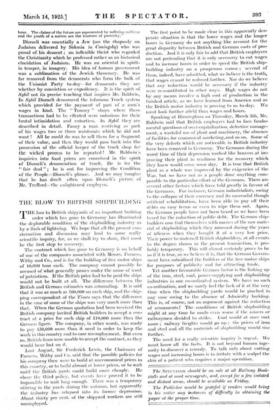THE BLOW TO BRITISH SHIPBCILPING
THE loss to British shipyards of an important building order which has gone to Germany has illuminated the deplorable condition of the shipbuilding industry as by a flash of lightning. We hope that all the present con- sternation and discussion may lead to some really scientific inquiry, for, as we shall try to show, that must be the first step to recovery. The contract which has gone to Germany is on behalf of one of the companies associated with Messrs. Furness, Withy and Co., and is for the building of five motor ships of 10,000 tons each. The company cannot possibly he accused of what generally passes under the name of want of patriotism. If the British 'price had to be paid the ships would not be built at all. The difference between the British and German estimates was astounding. It is said that it was as much as £60,000 on each ship, and the ship- ping correspondent of the Times says that the difference in the case of some of the ships was very much more than that. When the German quotation had been received the British company invited British builders to accept a con- tract at a price for each ship of £10,000 more than the German figure. The company, in other words, was ready to pay f.50,000 more than it need in order to keep the Work in this country and to ease unemployment. But even so, British firms were unable to accept the contract, as they Would- have lost on it. • Last August; Sir Frederick Lewis, the Chairman of Furness, Withy and Co. said that the possible policies for his company then were to. build at uneconomical prices in this country, or to build abroad at lower prices, or to wait until the British; yards could. build; more .cheaply. He chose . the third, policy, but. events have proved it to be impossible to wait long enough. There was a temporary stirring in the yards during the autumn, but apparently the industry has relapsed into its former depression: About thirty per cent: of the shipyard workers Marc stilt unemployed. The first point to be made clear in this apparently des- perate situation is that the lower wages and the longer hours in Germany do not anything like account for the great disparity between British and German costs of pro- auction. And it is only fair to add that British employers are not pretending that it is only necessary to cut wages and to increase hours in order to speed the British ship- building industry on a prosperous course ; several of them, indeed, have admitted, what we believe is the truth, that wages cannot be reduced further. Nor do we believe that any reduction would be necessary if the industry were re-constituted in other ways. High wages do not by any means involve a high cost of production in the finished article, as we have learned front America and as the British motor industry is proving to us to-day. We must look- further afield than wages and hours.
Speaking at Birmingham on Thursday, March 5th, Mr. Baldwin said that British employers had to face funda- mental questions of over-capitalization, defective manage- ment, a wasteful use of plant and machinery, the absence of facilities for economical marketing, and so on. Some of the very defects which are noticeable in British industry have been removed in Germany. The Germans during the worst time of their depression worked like beavers at im- proving their plant in readiness for the recovery which they knew would come some day. It is true that British plant as a whole was improved by the exigencies of the War, but we have not as a people. done anything. com- parable to the particular effort of the Germans. There arc several other factors which. have told greatly in favour of the Germans. For instance, German industrialists, owing to the collapse of. their currency and its successful though artificial rehabilitation, have been, able to pay off their debts on easy terms or even to wipe them out. Again, the German people have not been taxed as we have been taxed for the reduction of public debt. The German ship- builders now find themselves with masses of the raw mate- rial of shipbuilding which they amassed during the years of idleness when they bought it at a very low price. Their power to undersell.British shipbuilders, at all events to the degree shown in the present transaction, is pro- bably temporary. This will almost certainly prove to be so if it is true, as we believe it is, that the German Govern- ment have subsidized the builders of the live motor ships for purposes of publicity and for attracting • trade.
Yet another favourable German factor is the linking up of the iron, steel, coal, power-supplying and shipbuilding industries in one co-ordinated system. We have no such co-ordination, and we sorely feel the lack of it at the very time when the shipbuilding yards would be pinched in any case owing to the absence of Admiralty building. This is, of course, not an argument against the reduction. of armaments I The conditions of British shipbuilding might at any time be made even worse if the miners or railwaymen decided to strike. Coal would at once cost more ; railway freights would go up ; the prices of iron and steel and all the materials of shipbuilding would rise further.
The need for a really scientific inquiry is urgent. We must know all the facts. It is not beyond human inge- nuity to discover a remedy. To talk only about cutting wages and increasing hours is to irritate with a scalpel the skin of a patient who requires a major operation.














































 Previous page
Previous page